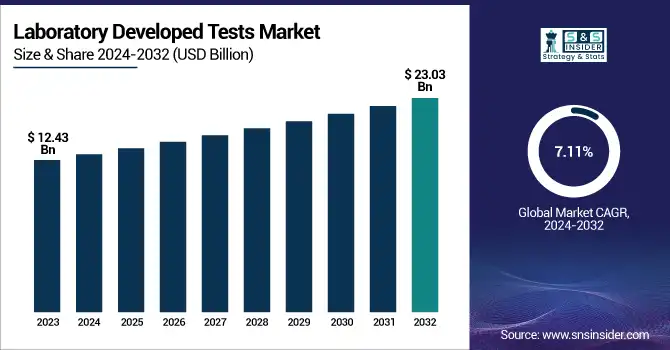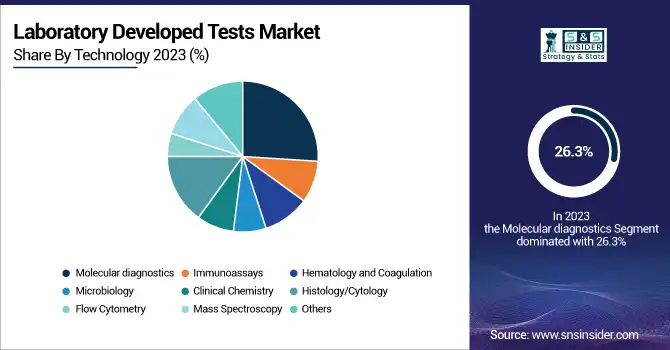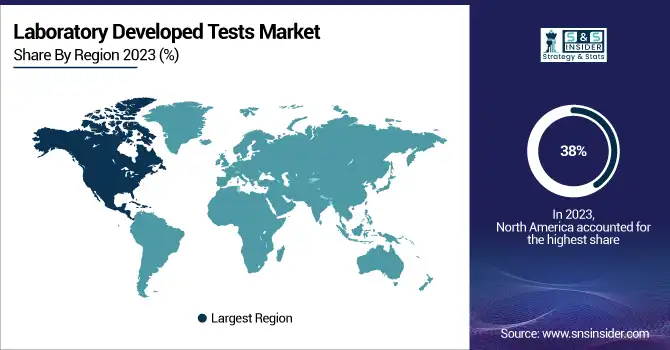Laboratory Developed Tests Market Analysis & Growth Forecast
The Laboratory Developed Tests Market was valued at USD 12.43 billion in 2023 and is expected to reach USD 23.03 billion by 2032, growing at a CAGR of 7.11% over the forecast period of 2024-2032. This report provides an overview of LDT utilization patterns by geography, fueled by the rising need for customized medicine and advanced diagnostic products. The research discusses regulatory and reimbursement trends affecting the market, since changing policies and coverage by payers have a considerable impact on test availability and utilization. It also discusses healthcare expenditure on LDTs, varying by region and type of payer, with private payers and government programs dominating funding. The report explores technological innovation and developments in LDTs, such as the incorporation of AI, NGS, and automation to improve accuracy and efficiency. Additionally, changes in testing preference are examined, contrasting the increasing trend toward in-house testing at healthcare facilities against the use of commercial LDT providers for advanced diagnostics.

To Get more information on Laboratory Developed Tests Market - Request Free Sample Report
The U.S. Laboratory Developed Tests Market was valued at USD 3.57 billion in 2023 and is expected to reach USD 5.62 billion by 2032, growing at a CAGR of 5.2% over the forecast period of 2024-2032. In the United States, the LDT market is growing with rising investments in precision medicine, increased demand for genetic and cancer testing, and continued regulatory debates about setting the course for test validation and regulation.
Laboratory Developed Tests Market Dynamics
Drivers
-
The increasing demand for personalized medicine, early disease detection, and precision diagnostics.
The increasing prevalence of chronic illnesses, such as cancer, cardiovascular disease, and genetic disorders, has spurred the development of highly specific and sensitive LDTs. For example, more than 1.9 million new cases of cancer were diagnosed in the U.S. in 2023, with increased demand for liquid biopsies and molecular oncology LDTs. Next-generation sequencing (NGS), PCR, and artificial intelligence (AI) diagnostics have increasingly improved the efficiency and precision of LDTs. Also, quick test development and adaptability provided by LDTs, particularly in times of health emergencies such as COVID-19, have further asserted their significance. The growing emphasis on biomarker-driven testing for treatment decision-making and the growth in companion diagnostics have also driven the market. In addition, growth in decentralized models of testing, home-based sample collection, and telehealth incorporation have further popularized LDTs. Pharmaceutical corporations and research centers are making significant investments in collaborations with clinical laboratories to create high-throughput, affordable tests. The implementation of automation and digital pathology technologies in lab settings is also decreasing turnaround times and improving diagnostic accuracy, further making LDTs a critical part of contemporary medicine.
Restraints
-
The LDT market faces significant restraints due to regulatory uncertainties, reimbursement challenges, and high development costs.
The lack of a consistent regulatory framework has resulted in variances in the process of validating and approving tests, especially within the U.S., where tighter regulation of LDTs is being proposed by the FDA. This uncertainty leads to challenges in compliance for smaller and medium laboratories that do not have the resource base to conform. Secondly, exorbitant expenses tied to R&D, sample analysis, and state-of-the-art equipment restrict availability, especially to small diagnostic centers and healthcare organizations. Reimbursement problems exacerbate market growth because most payers do not pay for LDTs completely, and it necessitates payment from patients in cash. For instance, in the field of oncology, while companion diagnostics become increasingly popular, insurers place caps on covering only FDA-approving tests, thus holding back wider utilization of innovative LDTs. Genomic and personalized testing data security and patient privacy issues also present challenges, as laboratories have to adhere to stringent data protection laws like HIPAA and GDPR. In addition, the high degree of test performance and reproducibility variability across laboratories affects trust and the widespread clinical use of LDTs.
Opportunities
-
The expansion of genomic medicine, emerging disease outbreaks, and AI-driven diagnostics.
Rising pressure for non-invasive and rapid testing technologies, including liquid biopsies and home genetic screening kits, is fueling research in the field. Companion diagnostics and pharmacogenomics are also picking up steam, providing personalized therapies based on a patient's genetic makeup. Direct-to-consumer (DTC) testing, led by firms like 23andMe and AncestryDNA, reflects the expanding interest in self-driven health information. Also, the use of machine learning and AI in diagnostics is improving test interpretation, lowering errors, and increasing efficiency. The growth of LDT applications in the detection of rare diseases, prenatal testing, and monitoring of infectious diseases offers additional growth opportunities. The creation of multiplex assays that enable simultaneous detection of more than one biomarker is also propelling market development. Collaborations among research organizations, biotechnology companies, and clinical laboratories are driving innovation and rapid test commercialization. As the drive for personalized and preventive medicine increases, the growth of LDTs into digital health platforms and wearable technologies for real-time monitoring of health offers attractive opportunities for market growth.
Challenges
-
The LDT market faces critical challenges, including regulatory disruptions, market fragmentation, and limited test standardization.
The new FDA regulation of LDTs, from CLIA to more stringent medical device classification, is causing uncertainty among clinical laboratories. Laboratories that are used to self-regulation and flexible test tweaking might have to bear additional costs and compliance if strict rules apply. A second challenge is extreme market fragmentation, with thousands of laboratories creating in-house tests, resulting in inconsistency in test methodologies, standards of validation, and clinical reproducibility. Unlike IVD (In Vitro Diagnostic) testing, LDTs do not have widespread benchmarking, so healthcare providers are at a loss when comparing and having confidence in results from multiple laboratories. Having high-quality biospecimens and reference datasets for the validation of the test is also a hurdle, especially with rare diseases when samples from patients are limited. In addition, competition from commercially available FDA-approved diagnostic tests is a hurdle, as a standard, broadly accepted test is preferred by some hospitals and clinics over LDTs. Finally, shortages of specialized laboratory staff are impacting the industry, as the increased complexity of molecular and genetic testing necessitates highly skilled professionals, creating bottlenecks in test processing and result interpretation.
Laboratory Developed Tests Market Segmentation Insights
By Technology
Molecular diagnostics was the highest revenue-fetching technology in the laboratory-developed tests (LDT) market, accounting for 26.3% of the market share in 2023. It follows the increasing usage of newer molecular methods, such as next-generation sequencing (NGS), polymerase chain reaction (PCR), and microarray-based assays. The growing need for personalized medicine, oncology testing, and infectious disease testing has also enhanced the dominance of the segment in the market. The accuracy and sensitivity of molecular diagnostics in identifying genetic mutations and infectious pathogens have established them as a laboratory choice of choice globally.
The immunoassays segment is anticipated to be the fastest-growing technology in the LDT market during the forecast period. Immunoassays have become popular because they are cost-effective, provide a quick turnaround time, and are highly versatile in detecting infectious diseases, hormone testing, and therapeutic drug monitoring. The increased use of point-of-care (POC) immunoassays, improved multiplex immunoassay platforms, and greater dependence on serological testing for new infectious diseases are the major drivers for its rapid growth.

By Application
The oncology segment held 23.01% of the overall LDT market revenue in 2023, which was the highest application area. The growing cancer burden globally, the expanding adoption of liquid biopsy, and the heightened need for early cancer detection have all played an important role in its dominance. Molecular oncology tests, such as companion diagnostics and biomarker-guided therapies, have transformed cancer care by allowing for personalized treatment strategies. The increase in targeted therapies and immuno-oncology products has further consolidated the demand for LDTs in cancer diagnosis.
The nutritional and metabolic disease segment is expected to register the fastest growth in the years to come. The increasing incidence of metabolic disorders, including diabetes, obesity, and genetic metabolic diseases, has increased the demand for early and accurate diagnostic methods. Improvements in metabolomics, biomarker diagnostics, and genetic screening for metabolic syndrome are fuelling the growth of this segment. Further, increasing awareness of preventive care and nutrition-driven diagnostics among consumers has driven LDT adoption across this space.
Laboratory Developed Tests Market Regional Analysis
North America was the leader in the Laboratory Developed Tests (LDT) market in 2023, contributing 38% of the total revenue share. This is propelled by the general adoption of precision medicine, the well-established CLIA regulatory structures, and intense research partnerships among academic institutions and diagnostic firms. The United States is the largest market, and major players like Mayo Clinic, Quest Diagnostics, and Labcorp are actively developing and commercializing LDTs. The high incidence of cancer, genetic diseases, and infectious diseases in the region has also driven demand for NGS-based and molecular diagnostics LDTs. Furthermore, reimbursement policies for next-generation and sophisticated diagnostic tests, coupled with ongoing advancements in liquid biopsy, pharmacogenomics, and digital pathology, have reinforced North America's grip on the market.
Asia-Pacific is the most rapidly growing market for LDTs, expected to grow considerably during the forecast period. The growing need for genetic testing, rising healthcare spending, and government initiatives toward precision medicine are driving factors enabling growth. China, India, and Japan are aggressively investing in clinical trial facilities, molecular diagnostics, and biotechnology. The Asia-Pacific market is likely to emerge at the highest growth rate, driven by the rising number of chronic diseases, improved awareness of early disease diagnosis, and increased laboratory networks. The high rate of AI-based diagnostics adoption in the region, along with automation advancements, will further boost market growth.

Get Customized Report as per Your Business Requirement - Enquiry Now
Key Players and Their LDT-Related Products
-
Quest Diagnostics Incorporated – OncoVantage, Cardio IQ, NeuromeDx
-
23andMe, Inc. – Genetic Health Risk Reports, Carrier Status Reports
-
Abbott – Vysis LDT FISH Probes, RealTime PCR LDTs
-
Guardant Health – Guardant360 LDT, GuardantOMNI LDT
-
NeoGenomics Laboratories – NeoTYPE Cancer Profiles, NGS Fusion Testing
-
Siemens Healthineers AG – Atellica Solution LDTs, ADVIA Chemistry LDTs
-
QIAGEN – QIAseq NGS Panels, TheraScreen Companion Diagnostics
-
Illumina, Inc. – TruSight Oncology 500, VeriSeq NIPT Solution
-
F. Hoffmann-La Roche Ltd. – FoundationOne CDx, AVENIO ctDNA Assays
-
BioReference Laboratories, Inc. – GenPath Oncology LDTs, ClariTest Prenatal Screening
Recent Developments
In Feb 2025, Molecular Instruments, Inc. (MI) introduced a groundbreaking advancement in dermatological diagnostics with its HCR Pro RNA-ISH technology. In collaboration with Yale School of Medicine’s Department of Dermatology, MI has developed novel laboratory-developed tests (LDTs) featuring a four-biomarker panel to accurately differentiate psoriasis and atopic dermatitis (eczema) in skin biopsies.
| Report Attributes | Details |
|---|---|
| Market Size in 2023 | USD 12.43 billion |
| Market Size by 2032 | USD 23.03 billion |
| CAGR | CAGR of 7.11% From 2024 to 2032 |
| Base Year | 2023 |
| Forecast Period | 2024-2032 |
| Historical Data | 2020-2022 |
| Report Scope & Coverage | Market Size, Segments Analysis, Competitive Landscape, Regional Analysis, DROC & SWOT Analysis, Forecast Outlook |
| Key Segments | • By Technology [Immunoassays, Hematology and Coagulation, Molecular Diagnostics, Microbiology, Clinical Chemistry, Histology/Cytology, Flow Cytometry, Mass Spectroscopy, Others] • By Application [Oncology (Companion Diagnostics, Genomics Sequencing & Other), Genetic Disorders/Inherited Disease, Infectious & Parasitic Diseases, Immunology, Endocrine, Nutritional & Metabolic Disease, Cardiology, Mental/Behavioral Disorder, Pediatrics-specific Testing, Hematology/General Blood Testing, Bodily Fluid Analysis, Toxicology, Other Diseases] |
| Regional Analysis/Coverage | North America (US, Canada, Mexico), Europe (Eastern Europe [Poland, Romania, Hungary, Turkey, Rest of Eastern Europe] Western Europe] Germany, France, UK, Italy, Spain, Netherlands, Switzerland, Austria, Rest of Western Europe]), Asia Pacific (China, India, Japan, South Korea, Vietnam, Singapore, Australia, Rest of Asia Pacific), Middle East & Africa (Middle East [UAE, Egypt, Saudi Arabia, Qatar, Rest of Middle East], Africa [Nigeria, South Africa, Rest of Africa], Latin America (Brazil, Argentina, Colombia, Rest of Latin America) |
| Company Profiles | Quest Diagnostics Incorporated, 23andMe, Inc., Abbott, Guardant Health, NeoGenomics Laboratories, Siemens Healthineers AG, QIAGEN, Illumina, Inc., F. Hoffmann-La Roche Ltd., BioReference Laboratories, Inc., ARUP Laboratories, Labcorp, Myriad Genetics, Inc., Invitae Corporation, and Eurofins Scientific. |

